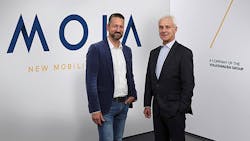With Electric Brand Moia, VW Goes After Uber, Apple
Volkswagen AG plans to expand its new mobility-services division into a business with billions in revenue as the German carmaker seeks salvation in ride-hailing, autonomous driving and electric cars in the wake of the diesel-emissions scandal.
Moia, Volkswagen’s 13th brand, will initially focus on ride-hailing and car-sharing and will roll out its services in two European cities next year before possibly expanding to other regions. Moia aims to be one of the world’s three biggest mobility providers and to generate revenue of “a couple of billion” of euros in a few years, Ole Harms, the Volkswagen unit’s head, told reporters.
“We’re a startup with VW group’s resources and we have a global aspiration,” Harms said ahead of the unit’s official unveiling today at the Tech Crunch Disrupt Conference. Volkswagen is open to selling a minority stake in Moia, in which it has invested an amount in the “significant three-digit million-euro range,” he said.
Volkswagen, still recovering from the year-old emissions-cheating scandal while transitioning into an era of robo-taxis, has been cutting costs to free up funds for developing electric cars, self-driving technologies and mobility apps. The German automaker has been late to innovate, taking its first step in May to expand beyond its traditional business of manufacturing and selling vehicles by investing $300 million in ride-hailing provider Gett Inc. By contrast, Daimler AG founded car-sharing service Car2Go in 2008 and has since added public-transit and cab hailing apps.
Making Moia a separate brand in a lineup that includes Audi and Porsche underscores VW’s strategic revamp to move beyond the scandal and prepare for a tectonic industry shift toward electric cars with new digital features that allow piloted driving or finding free parking spaces via apps.
Automakers across the globe have been stepping up efforts to expand digital offerings as Silicon Valley giants like Apple Inc. and Google Inc. plot inroads in the industry and manufacturers fight back to avoid being degraded to mere hardware suppliers. Ride-hailing services such as Uber Technologies Inc. are calling into question whether drivers need to buy vehicles.
“Even though not everyone will still own a car in (the) future, Moia can help make everyone a customer of our company in some way or another,” VW AG CEO Matthias Mueller said in a statement.
Moia’s first car, which could be battery-powered and feature autonomous driving options, may be ready before 2021, Harms said. The brand’s services may eventually expand to the U.S., China or Latin America.
While Moia’s stand-alone position allows it to pursue its own mobility strategy, the division’s first auto may be co-branded with other VW group marques, he said. Volkswagen’s other units are also expanding their digital and electric offerings.
The VW namesake brand has outlined plans to establish a platform dubbed “We,” comprising a range of services that could be used by 80 million customers by 2025. Audi offers car sharing in San Francisco and Hong Kong and next year plans to show its first series car that’s capable of driving itself at speeds of close to 40 mph.
Based in Berlin, Moia will have about 200 employees by the end of next year compared with 50 now, Harms said. Volkswagen plans to generate a “substantial part” of its revenue with mobility services by 2025, according to the statement.
“We want to be a relevant player,” Harms said. “Our clear objective is to become a unicorn.”
By Christoph Rauwald
About the Author
Bloomberg
Licensed content from Bloomberg, copyright 2016.
